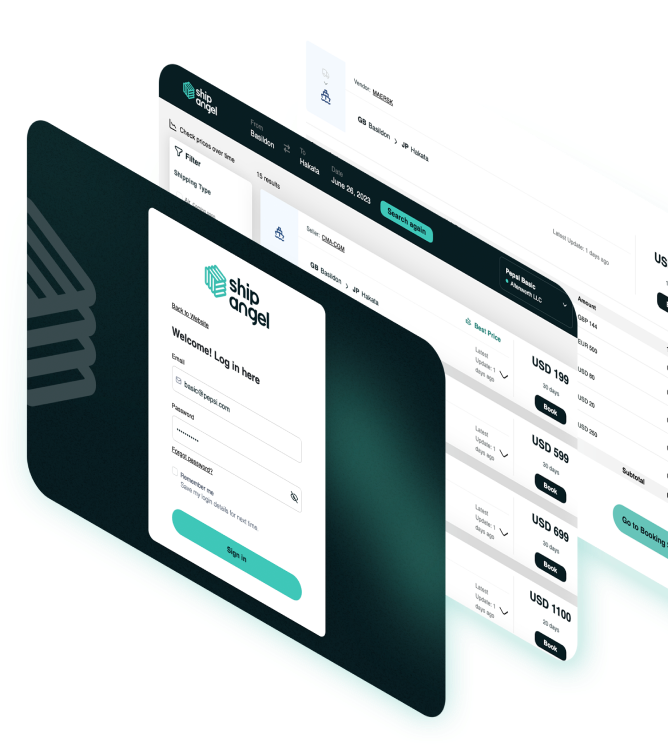-1.png)
In freight, speed and accuracy are no longer nice-to-haves. They’re survival.
Yet most shippers are still running their logistics operations across a patchwork of spreadsheets, legacy TMS systems, carrier portals, and endless email chains. Rates live in one place, bookings in another, invoices in yet another. Sales, procurement, finance, and operations teams often aren’t looking at the same data, or worse, they’re relying on conflicting versions of it.
This fragmented approach might have worked in the past, but in today’s volatile environment, it leaves teams slower, less informed, and constantly reacting to problems instead of getting ahead of them.
The smartest freight teams know there’s a better way. They run everything on one platform.
The Problem with Fragmentation
Freight operations touch nearly every part of a business. Procurement negotiates contracts. Sales needs rates to quote customers. Operations manages bookings and exceptions. Finance audits invoices. Leadership demands accurate reporting to make strategic calls.
When all of these functions live across disconnected tools, three problems emerge:
- Duplication and errors – Teams enter the same data into multiple systems, creating version conflicts and mistakes.
- Slow decision-making – Without shared visibility, questions like “What’s our current exposure?” or “Is this rate competitive?” take hours or days to answer.
- Costly surprises – Invoice discrepancies slip through the cracks, vendor rate errors go unchallenged, and small misalignments add up to big expenses.
Why One Platform Wins
Running freight on a single, connected platform changes the game.
- A single source of truth – Everyone, from procurement to finance, works from the same data set. No more spreadsheets circulating with conflicting numbers.
- Real-time collaboration – Sales can quote with confidence, finance can flag discrepancies instantly, and procurement can respond quickly to market shifts.
- AI-driven insights – Automation and intelligence only work when data is centralized. An integrated platform makes it possible to forecast, benchmark, and optimize in real time.
- Efficiency at scale – One platform eliminates duplicate entry, manual reconciliations, and system-hopping, freeing teams to focus on strategy.
What One Platform Looks Like in Practice
Imagine how a day changes when everything runs on one system:
- Sales can access live, benchmarked rates and generate quotes in seconds, instead of chasing procurement for updates.
- Procurement can flag an incorrect vendor rate, send a message directly within the platform, and see it fixed in real time, without email chains or delays.
- Finance doesn’t need to manually audit invoices. Errors and discrepancies are automatically flagged, with approvals routed in-platform.
- Operations books seamlessly, without juggling multiple carrier portals or systems.
- Leadership can see real-time reporting on spend, performance, and market position, and act on insights, not lagging indicators.
The Results
Shippers that consolidate freight operations onto one platform see results quickly:
- Faster cycle times – Rate requests, bookings, and quotes are turned around in minutes, not hours.
- Cost savings – Automated invoice auditing and real-time benchmarking catch discrepancies before they hit the bottom line.
- Risk reduction – With fewer manual touchpoints, there are fewer errors, missed updates, and unpleasant surprises.
- Competitive advantage – Teams aren’t bogged down in admin. They’re agile, strategic, and able to respond faster than competitors.
It’s not about doing more with less. It’s about doing smarter with one.
The Freight Industry’s Inevitable Shift
The past two decades of freight technology have been defined by complexity. TMS systems grew larger, processes grew heavier, and teams were left managing more systems than before.
But the next decade will look very different. Leading shippers are already moving away from fragmented stacks and toward unified, AI-powered platforms. They’ve recognized that every disconnected tool adds friction, and that the teams who consolidate will outpace those who don’t.
The smartest freight teams aren’t just surviving today’s volatility. They’re building resilience and speed into the way they operate. And they’re doing it by centralizing on one platform.
Freight is no longer won by the company with the most contracts or the biggest staff. It’s won by the team that can move fastest, see clearly, and make decisions in real time.
That’s only possible on one platform.
Want to see how leading BCOs are consolidating their freight operations into a single system? Book a call with our team.
 Dan Healy
Dan Healy
 August 20, 2025
August 20, 2025
